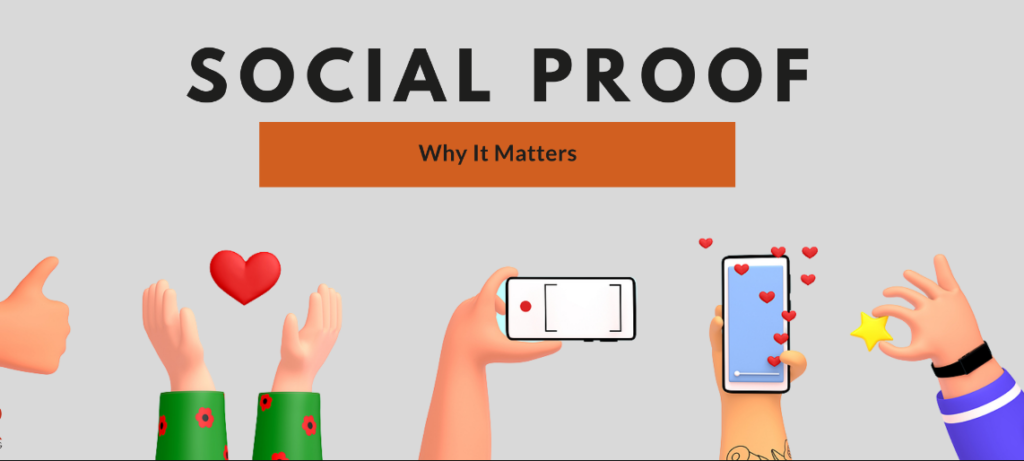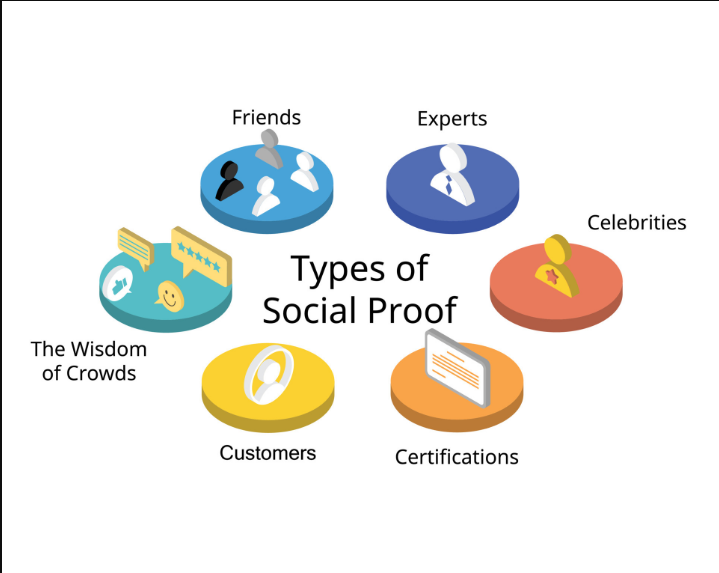The digital landscape has become so competitive that an established brand has to win customer trust to remain on top. That is where social proof in digital marketing comes into the picture, giving brands a competitive edge over others. Social proof is a key component for digital agencies to establish credibility and grab audience attention. Online reviews are a perfect example of social proof.

For instance, you are searching for hotels for a family dinner. Finally, the list has been narrowed down and you are left with two options. Now you will decide after checking the online reviews about that specific hotel.
Your decision was driven by a motivation that you gained from excellent customer reviews. These reviews are social proof that led you to select that hotel.
This article will explain everything you need to know about how brands can leverage social proof to dominate the digital world.
Table of contents
What is Social Proof
Social proof refers to a human behavior concept that enables an individual to act after seeing others have done it. Picture this, you are standing in front of an ice cream shop and it has a long line of customers waiting.
You would love to buy its ice cream, assuming it the best one in the town. In Digital Marketing, you can utilize social proof to build customer trust, driving engagement and conversion through techniques like testimonials.
Types of Social Proof
There are numerous types of social proof that brands can leverage to boost their internet visibility.

Scarcity Notifications
You have heard about a social phenomenon FOMO (Fear of missing out). It refers to a behavioral principle where humans prefer items, or opportunities important because of their limited availability. Brands can use this concept to create a sense of emergency among buyers.
They must highlight popular items on the website through pop-ups and indicate how many people have already purchased it. Use terms like `trending` or `limited time offer`.
Customer Feedback
Customer feedback refers to online reviews where the audience leaves their opinion about their experience with your product. Positive feedback helps in building other users’ trust while a negative one can harm your website.
Incorporate highly positive feedback on your product pages and share them on every social channel to engage the audience. Moreover, include them in your email marketing campaigns to win the trust of new customers.
Awards
Awards increase your product or service’s value in the online world. When your product receives recognition from industry experts, your brand value goes at the sky. Displaying your accomplishments helps in attracting new clients and increases conversions.
Make the most out of these awards by sharing them on social media platforms. In addition, present them prominently on your website. Highlight them in your email campaigns and also include them in press releases.
User-Generated Content
USG content involves plain text, videos, and images created by the audience. It shows the real-life experience of the users which can be more credible than your content. You can use it to gain trust and credibility in the digital world.
Feature it in your blog posts and share it on social media with appropriate hashtags. Moreover, include it in your product pages to ensure that every new user sees how trustworthy you are.
Common Mistakes to Avoid

Fake Reviews and Testimonials
Using fake reviews and testimonials can severely damage your brand’s reputation. Authenticity is key; always use real feedback from actual customers.
Overwhelming Users with Information
While social proof is essential, bombarding users with too much information can be counterproductive. Balance the amount of social proof with other content to avoid overwhelming your audience.
Neglecting Negative Feedback
Ignoring negative feedback can harm your brand. Addressing it constructively shows potential customers that you value all feedback and are committed to improving.
Conclusion
Social proof is a powerful tool in digital marketing, capable of building trust, influencing consumer behavior, and driving conversions. By effectively leveraging various forms of social proof, brands can enhance their credibility and foster stronger connections with their audience, ultimately leading to increased success in the competitive digital landscape.
Read more : Enhancing Your Digital Presence with Local SEO
FAQs
Social proof is a psychological phenomenon where people mimic the actions of others to reflect correct behavior in a given situation, often used in marketing to build trust.
Social proof influences consumer behavior by building trust, creating a fear of missing out (FOMO), and encouraging herd mentality, which leads to higher conversion rates.
Examples of social proof include expert endorsements, celebrity endorsements, user reviews, case studies, social media shares, and influencer marketing.
You can use social proof by displaying customer testimonials, featuring user-generated content, showcasing client logos, and highlighting awards on your website and social media channels.


